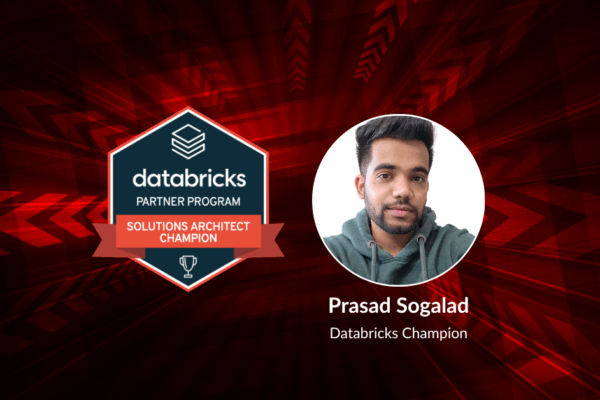The Databricks Partner Champion Program recognizes individuals who demonstrate technical mastery, thought leadership, and a commitment to advancing the data and AI ecosystem. We sat down with Perficient lead technical consultant Prasad Sogalad, recently named a Databricks Champion, to learn about his journey, insights, and advice for aspiring professionals.
Q: What does it mean to you to be recognized as a Partner Champion?
Prasad: Personally, this recognition validates a sustained commitment to continuous technical excellence and dedicated execution across client engagements.
Professionally, it provides privileged access to strategic intelligence and platform innovation roadmaps. This positioning enables proactive integration of emerging capabilities into client architectures, delivering competitive differentiation through early adoption.
Q: How have you contributed to Databricks’ growth with key clients or markets?
Prasad: My contributions center on driving legacy infrastructure modernization through Lakehouse architecture implementation across strategic vertical markets. For example, I provided architectural leadership for an engagement with a Tier-1 healthcare institution that achieved a 40% improvement in ETL pipeline throughput while reducing costs through compute optimization and Delta Lake strategies.
Q: What technical or business skills were key to achieving this recognition?
Prasad: Recognition as a Databricks Champion requires mastery across both technical and strategic competency dimensions:
Technical Depth in Data Engineering & AI
Comprehensive expertise across the data engineering technology stack, including Apache Spark optimization techniques, Delta Lake transactional architecture, Unity Catalog governance frameworks, and MLOps workflow patterns. This extends to advanced capabilities in performance tuning, cost optimization, cluster configuration, and architectural pattern selection optimized for specific use case requirements and scale characteristics.
Architectural Vision & Business Alignment
The ability to decompose complex, multi-faceted business challenges—such as fraud detection systems, supply chain visibility platforms, or regulatory compliance reporting—into scalable, production-ready Lakehouse implementations. This requires translating high-level stakeholder requirements and strategic business objectives into technically sound, maintainable architectures that deliver measurable ROI and sustainable competitive advantage.
Q: What advice would you give to someone aiming to follow a similar path?
Prasad: Success requires transcending basic platform utilization to achieve true ecosystem mastery. I recommend a three-pronged approach:
- Be a Builder—Develop Engineering Excellence: Move beyond notebook-based experimentation to production-grade engineering practices. This requires developing a comprehensive understanding of Delta Lake internals, mastering advanced Spark optimization techniques for performance and cost efficiency, and implementing robust infrastructure-as-code practices using tools like Terraform and CI/CD pipelines. Focus on building solutions that demonstrate operational excellence, scalability, and maintainability rather than proof-of-concept demonstrations.
- Learn Governance—Master Unity Catalog: Develop deep expertise in Unity Catalog architecture, including fine-grained access control patterns, data lineage tracking, and compliance framework implementation. As regulatory requirements intensify and data mesh architectures proliferate across enterprises, governance capabilities become increasingly critical differentiators in client engagements. Demonstrating mastery of security, privacy, and compliance controls positions you as a trusted advisor for enterprise-grade implementations.
- Teach What You Know—Engage in Community Leadership: While technical certifications validate knowledge acquisition, Champion recognition requires demonstrated leadership through active knowledge dissemination. Contribute to the community ecosystem through mentorship programs, technical blog posts, conference presentations, or user group facilitation. This external visibility and commitment to elevating others’ capabilities distinguishes practitioners and accelerates the path to Champion recognition.
Q: Are there any recent trends or innovations in Databricks that excite you?
Prasad: I am particularly excited about the convergence of two transformative platform innovation vectors:
LLMs/Generative AI Integration
The integration of advanced AI capabilities within the Databricks platform, particularly through MosaicML and the introduction of native tooling for fine-tuning and deploying large language models directly on the Lakehouse, represents a paradigm shift in enterprise AI development. These capabilities democratize access to Generative AI by enabling organizations to build, customize, and deploy proprietary LLM applications within their existing data infrastructure, eliminating complex cross-platform integrations and data movement overhead while maintaining governance and security controls. This positions the Lakehouse as a comprehensive platform for both traditional analytics and cutting-edge AI workloads.
Databricks Lakebase
The introduction of a fully managed PostgreSQL service represents a fundamental architectural evolution. By providing native transactional database capabilities within the Lakehouse, Databricks eliminates the traditional separation between operational (OLTP) and analytical (OLAP) data stores. This architectural consolidation allows transactional data to reside directly alongside analytical datasets within a unified Lakehouse infrastructure, dramatically simplifying system architecture, reducing data movement latency, and minimizing pipeline complexity. This advancement moves the industry significantly closer to realizing the vision of a truly unified data platform capable of supporting the complete spectrum of enterprise data workloads—from high-velocity transactional systems to complex analytical processing—within a single, governed environment.
Q: Now that you’ve received this recognition, what are your plans?
Prasad: My roadmap focuses on platform enablement and IP adoption. I plan to lead initiatives that drive adoption of proprietary frameworks like ingestion and orchestration systems, and host optimization workshops dedicated to Spark performance and FinOps strategies. These efforts will empower teams and clients to maximize the value of Databricks.
Congratulations Prasad!
We’re proud of Prasad’s achievement and thrilled to add him to our growing list of Databricks Champions. His journey underscores the importance of deep technical expertise, strategic vision, and community engagement.
Perficient and Databricks
Perficient is proud to be a trusted Databricks elite consulting partner with 100s of certified consultants. We specialize in delivering tailored data engineering, analytics, and AI solutions that unlock value and drive business transformation.
Learn more about our Databricks partnership.
